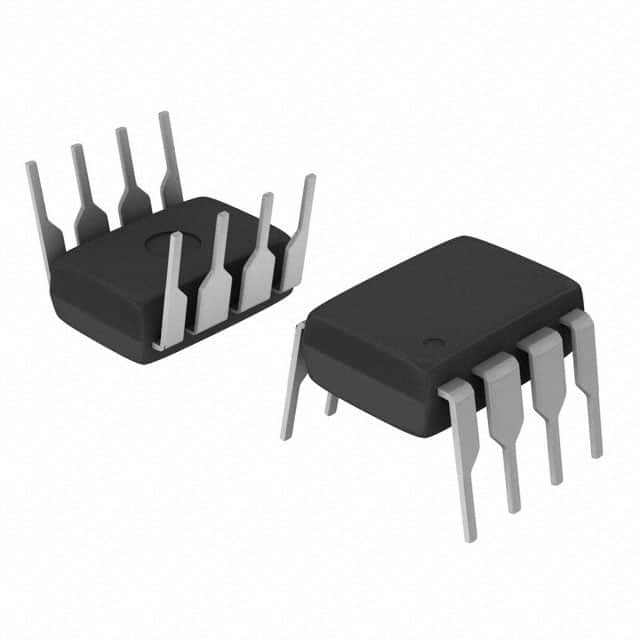Siehe Spezifikationen für Produktdetails.

DS1302
Product Overview
- Category: Integrated Circuit (IC)
- Use: Real-time Clock (RTC) module
- Characteristics: Low power consumption, simple interface, accurate timekeeping
- Package: DIP (Dual In-line Package)
- Essence: The DS1302 is a real-time clock module that provides accurate timekeeping functionality for various electronic devices.
- Packaging/Quantity: Available in packs of 10 or individually.
Specifications
- Supply Voltage: 2.0V to 5.5V
- Timekeeping Accuracy: ±2 minutes per month at 25°C
- Operating Temperature Range: -40°C to +85°C
- Data Retention: Over 10 years
- Clock Frequency: 31.25 kHz
Pin Configuration
The DS1302 has a total of 8 pins:
- VCC: Power supply input
- GND: Ground connection
- CLK: Clock signal input/output
- RST: Reset signal input
- DAT: Bidirectional data line
- IO: Output control pin
- SCLK: Serial clock input
- CE: Chip enable input
Functional Features
- Real-time clock with seconds, minutes, hours, day, date, month, and year information
- Battery backup for continuous timekeeping during power loss
- Simple interface for easy integration into various electronic systems
- Programmable square wave output for generating periodic signals
- Trickle charger for backup battery recharging
Advantages and Disadvantages
Advantages: - Low power consumption extends battery life - Accurate timekeeping ensures reliable operation - Simple interface allows for easy integration - Wide operating temperature range enables usage in various environments
Disadvantages: - Limited memory capacity for storing additional data - Lack of advanced features compared to more advanced RTC modules
Working Principles
The DS1302 utilizes a quartz crystal oscillator to generate clock signals, which are used to keep track of time. It communicates with the host microcontroller through a simple bidirectional data line and a few control pins. The module also includes a battery backup system that ensures continuous timekeeping even during power loss.
Detailed Application Field Plans
The DS1302 is widely used in various electronic devices that require accurate timekeeping functionality. Some common applications include:
- Digital clocks and watches
- Electronic calendars
- Timers and alarms
- Data loggers
- Home automation systems
Alternative Models
- DS3231: Offers higher timekeeping accuracy and additional features such as temperature compensation.
- PCF8563: Provides similar timekeeping functionality with low power consumption and I2C interface.
- MCP7940N: Features battery-backed real-time clock/calendar with SRAM and alarm functions.
These alternative models offer different specifications and features, allowing users to choose the most suitable option for their specific requirements.
In conclusion, the DS1302 is a reliable real-time clock module that provides accurate timekeeping functionality for various electronic devices. Its low power consumption, simple interface, and wide operating temperature range make it a popular choice among designers and hobbyists alike.
Listen Sie 10 häufige Fragen und Antworten im Zusammenhang mit der Anwendung von DS1302 in technischen Lösungen auf
Sure! Here are 10 common questions and answers related to the application of DS1302 in technical solutions:
Q: What is DS1302?
A: DS1302 is a real-time clock (RTC) module that provides accurate timekeeping for various technical applications.Q: How does DS1302 communicate with microcontrollers?
A: DS1302 uses a simple 3-wire interface (data, clock, and chip select) to communicate with microcontrollers.Q: Can DS1302 operate on its own without a microcontroller?
A: Yes, DS1302 has a built-in trickle charger and backup battery support, allowing it to function independently.Q: What is the accuracy of DS1302's timekeeping?
A: DS1302 has a typical accuracy of ±2 minutes per month, making it suitable for most applications.Q: Can DS1302 handle daylight saving time changes automatically?
A: No, DS1302 does not have built-in functionality for handling daylight saving time changes. It requires manual adjustment.Q: Can DS1302 be used in low-power applications?
A: Yes, DS1302 has a low power consumption mode, making it suitable for battery-powered devices.Q: How many alarms can be set using DS1302?
A: DS1302 supports up to two programmable alarms, which can trigger an interrupt or output a signal.Q: Does DS1302 have temperature compensation for accurate timekeeping?
A: No, DS1302 does not have built-in temperature compensation. External temperature compensation may be required for precise timekeeping.Q: Can DS1302 be used in industrial environments?
A: Yes, DS1302 is designed to withstand industrial temperature ranges and is suitable for use in harsh environments.Q: What programming languages can be used to interface with DS1302?
A: DS1302 can be interfaced with various programming languages such as C, C++, Python, Arduino, and many more.
Please note that these answers are general and may vary depending on the specific implementation and requirements of your technical solution.

